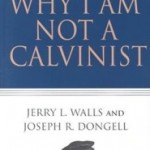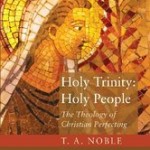William Birch: The Modern Reductionist Gospel of Evangelicalism
Guest blog by William Birch, who used to blog at Classical Arminian, etc. now has a blog here: The Episcocrat. He says about himself: “…I came to faith in Christ in 1995, thereafter developing interests in theology and Church history. I hold two degrees: one in English and another in Biblical Studies. (I plan to begin a Masters degree program in the near future, degree focus as yet unknown.)”
Billy used to regularly blog on Arminius and Arminian theology. He did this beginning in 2007. He doesn’t do that anymore. He has moved on to other topics.
I grew up thinking that the gospel referred to the plan of salvation. I was also Southern Baptist educated in that same tradition: the plan of salvation was the gospel in toto. My Pentecostal friends informed me in the mid 1990s of the full gospel, which referred to a practical use of all the spiritual gifts mentioned in the New Testament; and that unless I subscribed to the full gospel then I was actually guilty of advocating a lesser gospel. Therefore the gospel was relegated to “sign gifts” and manifestations of healing and being “slain in the Spirit.”
In the late 1990s, I was informed of the gospel of grace by my Calvinist friends, which is also referred to as the doctrines of grace (or Calvinism). This, I was told, was the only biblical approach to proper doctrine and theology. (When convincing others of your particular pet dogma, just inform those whom you are proselytizing that your dogma is biblical, and all other positions are heterodox or heretical. This tack will, most likely, intimidate and manipulate your potential convert into adopting your views.) If I didn’t adhere to the biblical doctrines of grace, I was unbiblical, robbing God of His glory, man-centered and possibly not saved.
 But do such notions actually define the gospel? What, exactly, is the gospel? Is it inherent within Pentecostalism? Calvinism? Personal salvation? In Scot McKnight’s 2011 book, The King Jesus Gospel: The Original Good News Revisited, he addresses the question “What is the gospel?” Is the gospel about personal salvation? Is the gospel about justification by faith? Did Jesus preach or even know these versions of the gospel? “Why is getting the gospel right important?” asks McKnight. He answers: “Our biggest problem is that we have an entire culture shaped by a misunderstanding of the gospel.”1 (emphasis added)
But do such notions actually define the gospel? What, exactly, is the gospel? Is it inherent within Pentecostalism? Calvinism? Personal salvation? In Scot McKnight’s 2011 book, The King Jesus Gospel: The Original Good News Revisited, he addresses the question “What is the gospel?” Is the gospel about personal salvation? Is the gospel about justification by faith? Did Jesus preach or even know these versions of the gospel? “Why is getting the gospel right important?” asks McKnight. He answers: “Our biggest problem is that we have an entire culture shaped by a misunderstanding of the gospel.”1 (emphasis added)
I had been taught that the gospel was tantamount something to the effect of an ABC formula: Admit that you are a sinner; Believe that Jesus died for your sins; and Confess Christ as Lord and Savior. This was a method of personal salvation, and this was the gospel, so I was taught. Each component of the ABC formula is true, as is justification by faith, but these alone are not the gospel. N.T. Wright very accurately writes, in the Foreword to McKnight’s book:
For many people, “the gospel” has shrunk right down to a statement about Jesus’ death and its meaning, and a prayer with which people accept it. That matters, the way the rotor blades of a helicopter matter. You won’t get off the ground without them. But rotor blades alone don’t make a helicopter. And a microcosmic theory of atonement and faith don’t, by themselves, make up “the gospel.”2
Hence we have today the product of twentieth- and twenty-first century breeding of a salvation culture rather than a gospel culture.
McKnight accurately defines evangelicals today as soterians (lit. salvation ones) rather than evangelicals proper, because they “equate the word gospel with the word salvation,” and the notion of personal salvation.3 While the plan, purpose and promise of salvation is contained in the gospel, it is not in and of itself the gospel. While justification by faith is one blessing of the gospel, it is not in and of itself the gospel, any more than sanctification or regeneration is the gospel. What is the gospel?
The gospel . . . is declaring the Story of Israel as resolved in the Story of Jesus. That was Paul’s gospel, and it was the apostolic gospel tradition, and that gospel shaped everything in the church until the Reformation, at which time that gospel was slightly shifted and eventually . . . [the concept of the] gospel was submerged under salvation [so much so that the] gospel was equated with [a motif of the] Plan of Salvation.4
Whenever we deconstruct the gospel to a mere formula, ignoring the story of Israel and how Jesus “fulfills, completes, and resolves Israel’s story,” we then “permit the gospel to collapse into the abstract, de-storified points in the Plan of Salvation.”5 The blight of such a bankrupt gospel is reduced to what the late Dallas Willard called “sin management,” which presumes “a Christ with no serious work other than redeeming humankind . . .” and that which fosters “vampire Christians,” who “only want a little blood for their sins but nothing more to do with Jesus until heaven.”6 That is a scathing critique of modern evangelicalism, and it is true.
__________
1 Scot McKnight, The King Jesus Gospel: The Original Good News Revisited, (Grand Rapids: Zondervan, 2011), 27. This book needs to be in the hands of all who profess Christ Jesus as King, in my opinion.2 Ibid., 13.
3 Ibid., 29.
4 Ibid., 79.
5 Ibid., 51.
6 Ibid., 76.














Excellent post. Modern evangelicals are not the only group that has reduced the Gospel to reductionist slogans, and the problem did not start with the revolt against modernity (or, in the case of Outlerian methodism, the embrace of modernity.)
The writer correctly sees the problems created in reducing the story to soteriology, but the problem is deeper. This is the point of N. T. Wright’s comment. The focus on the forensic aspects of salvation is the real problem.
It is nice to hear so many voices calling us to a fuller understanding of the Gospel.